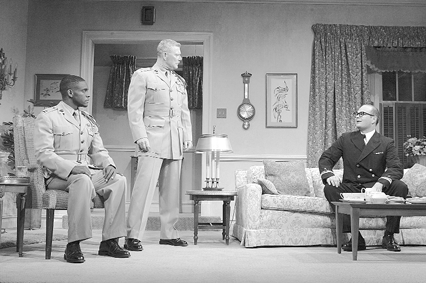John Patrick Shanley’s “Defiance” pales alongside his prior triumph
A Pulitzer Prize. Four Tony Awards, including Best Play and Best Director. The highest-grossing Broadway play of all time. That’s the glory that is “Doubt,” the 2005 provocative stunner authored by John Patrick Shanley and directed by Doug Hughes. And it’s still going gangbusters.
But what’s this—the duo back with another work? And it’s not just any old play, but “Defiance,” the second in a proposed trilogy of “hierarchy plays” in which Shanley exposes the decay and hypocrisy of once-sacred institutions. And it’s given the full on, high-gloss treatment we’ve come to expect from the Manhattan Theatre Club, where “Doubt” originated before its Broadway transfer.
Comparisons to “Doubt” are not just fair, they’re absolutely mandatory. These guys are begging for it. After all, the entire creative team—set, music, lights, costumes—worked on the tour de force as well.
As with a beloved Olympic gold-medallist returning to recapture past glories, we rooted for “Defiance” to be another winner, knowing full well that, chances are, the play could fall on its ample behind.
And that’s pretty much the fate of this ambitious production. Shanley has loaded “Defiance” with so many weighty ideas that, when the baggage of “Doubt” is piled on, it’s no wonder it buckles and falters. To its credit, the play, huffing and sweating, boldly perseveres as if nothing is awry.
While “Doubt” focuses on the cracking foundations of the Catholic Church in the 1960s, “Defiance” tackles the U.S. Marine Corps in 1971. In this man’s military, blacks clash with whites, recruits long for “peace, love, and happiness,” and asking the question “why?” can land you in the brig.
The play centers on Lieutenant Colonel Littlefield (Stephen Lang), a white, hard-nosed career military man, who coerces by-the-books Captain King, who is black, to help him quell the racial tensions at Camp Lejeune in North Carolina. “…It matters to me not at all if you’re black, white, blue, or stupid,” the colonel says. “You are Marines. You are green in the eyes of the Corps.”
The seriously sullen King, not so coincidentally named for a certain civil rights hero, whose murder on April 4, 1968 he blames for his lack of spirit. He also makes a point of taking his coffee “black.”
Chaplain White (Chris Bauer)—no subtlety there—a Lutheran who annoys Colonel Littlefield with his churlish idealism, waxes about the evils of cynicism and the joys of good works. He fails to see the contradiction of being a man of the cloth in service of a “killing machine.” The colonel’s wife, Meg, who was born for better things than serving homemade iced lemonade and buns on Sunday afternoons, may be growing weary of standing by her man.
To be sure, “Defiance” echoes similar themes presented so eloquently in “Doubt.” Unfortunately, plot and to some extent character are sometimes betrayed by ideas. Despite all the yammering about racial inequality, abuse of authority (God included), and morality versus morale, there’s scant dramatic tension until a full hour into the 90-minute, intermission-less play. That’s when Private Davis, a tattered basket case, well played by Jeremy Strong, alleges that the colonel sexually violated his young wife.
Too bad the mystery of the colonel’s culpability is solved way too soon. One of the principal appeals of “Doubt” is the ever-shifting question of the main character’s guilt or innocence. We feel the knot in our stomach constrict tighter with each searing scene.
Despite such disappointments, there is much to admire here. Under the seasoned direction of Hughes, the performances are compelling, if you can forgive Bauer’s wayward Alabama drawl, and Lang’s occasional imitation of George C. Scott’s Patton. Chris Chalk’s portrayal of the “tin soldier” Captain King is spot on, not that he’s anyone you’d ever really want to toss back a lemonade with.
The evening’s brightest note is Margaret Colin as the wise Meg, the most fully realized character, who serves as the emotional glue that keeps the play intact. She’s torn between being a dutiful military wife and her own woman, and we truly feel her pain.
The fast moving set, which meticulously recreates a pristine Nixon-era abode, is smartly designed by John Lee Beatty (“The Color Purple,” “Doubt”). Costumes are courtesy of the most in-demand designer on Broadway, Catherine Zuber, who has recently dressed up “The Light in the Piazza,” “Little Women,” “Seascape,” and yes, “Doubt.”
Oddly enough, despite the lofty subject matter, the 55 year-old playwright includes in the promotional materials a silly bio worthy of “Dirty Rotten Scoundrels.” Eschewing any mention of his past theatrical feats, it quips about his real-life military service—“He never went to Vietnam”—and all the schools he was either punished or expelled from. The blurb illustrates his defiance, but it comes across as a mockery of the gravity of this admirable, if overwrought, work.
gaycitynews.com


































